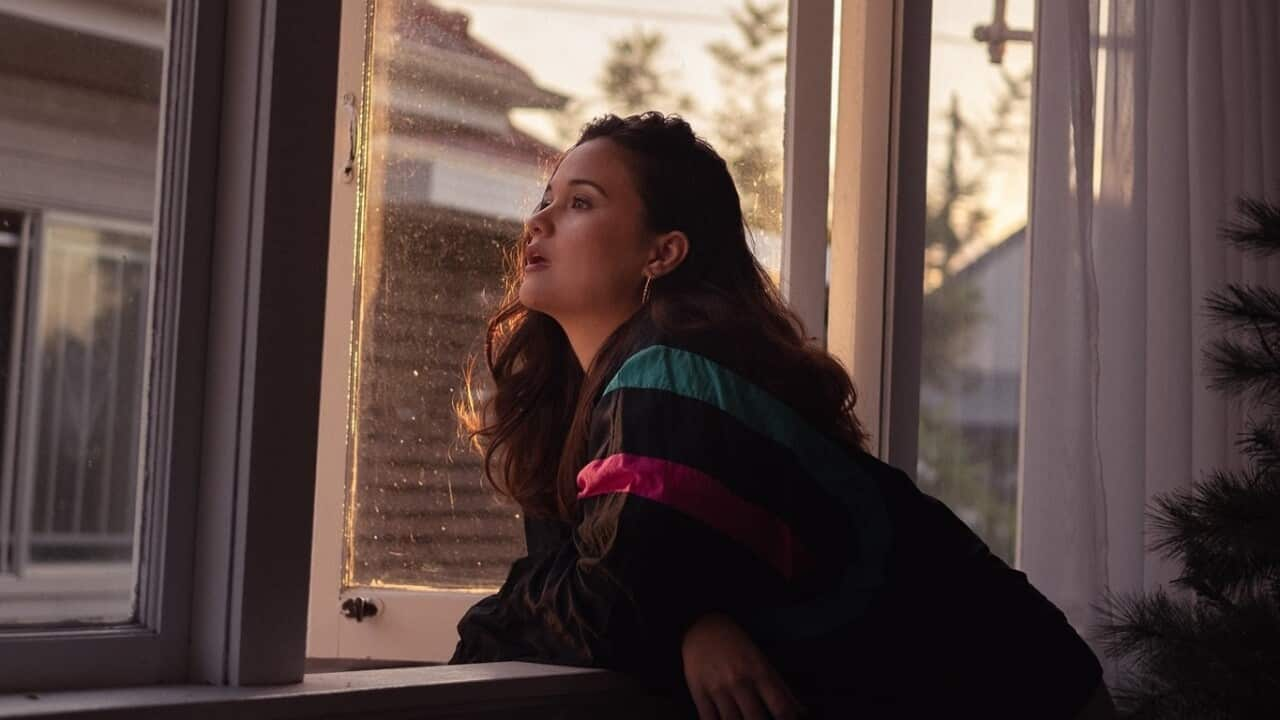(Aboriginal and Torres Strait Island readers are advised that the following article may contain images of people who have died.)
"When my father, John, died in 2022, I had to write a eulogy and it made me look deeper into our family. It was a much more difficult process than I anticipated. Because he died so suddenly, I wasn't prepared."
Boxes of memories were laid out before Visayan-Australian Mark Smith as he tried to put into words the richness of his father's life and the difficult feelings of saying goodbye. Doing so led him down a path of discovery about his grandparents' love, his father's life, and the Aboriginal children who became like family to them.
Love letters from a priest
When World War II erupted, Smith's grandmother, Isabel Almond, was living in Adelaide.
"Her boyfriend then was sent to Alice Springs for military training to prepare for an attack on Australia.
"At Christmastime, she took the train to Alice Springs to visit him," Mark Smith shared.

Isabel Almond, Mark Smith's grandmother, as a young woman. Credit: Mark Smith
"They had a connection and he introduced her to the Aboriginal people in the area.
She saw the conditions her new friends were living in. They were appalling — government camps on the fringes of town, rooms with no windows, 40 kids to a room.Mark Smith, Screenwriter
"She was blind to this, having lived in comfortable Adelaide. The pain and suffering of the children stayed with her. She felt that she needed to do something."
From a desire to want to do something, the direction of her life changed.
She began writing to the priest. They developed a romance and ended up getting married.

Percy and Isabel Smith's wedding day Credit: Mark Smith
The boys at St Francis House
The Smiths established St Francis House to create a home for Aboriginal boys in Alice Springs.
Becoming carers to the boys, the couple enabled them to eventually move to Adelaide for them to pursue higher education and find better employment opportunities.
Isabel became a surrogate mother to the boys, particularly those who didn't have mothers or maternal figures in their lives.

A group of boys from St Francis House and the Smiths Credit: Mark Smith
"Guys like Charlie Perkins and John Moriarty...they copied what Martin Luther King was doing and started the civil rights movement here. They started the The Australian Aboriginal Progressive Association (A.A.P.A.)

Mark Smith's paternal grandparents had a close relationship with Aboriginal mothers and children who lived in the government camp called 'The Bungalow'. Some of the children grew up to become academics and activists of the 1960s civil rights movement. Credit: Mark Smith
Like brothers
The boys at St Francis House became like brothers to Mark Smith's father.
"My father was an only child and he had all these Aboriginal brothers. My mother, Fe, on the other hand, had 9 siblings. Even though my father was an only child, he had all these guys being like brothers to him. They grew up together, so he understood what being part of a big family meant.
Smith also shared that his maternal grandparents, who migrated to live with them in Adelaide when he was younger, bonded with his father's Aboriginal brothers.

A young Mark Smith [older child], his brother Stephen [younger child], mother Fe and maternal grandparents, and father John [second to the right]. Credit: Mark Smith
"I knew about his closeness to his particular Aboriginal brothers, but I didn't appreciate and really know how deep his bonds were to others."
Smith shared that his father had been a school teacher, teaching in different areas of regional South Australia. One of those schools was Point Pearce Aboriginal School.
In the 1970s, he found there a similar situation for Aboriginal children as what his father found in Alice Springs. He used what he learned from his parents to help the children there.Mark Smith, Screenwriter
"He found them accommodation to live in Adelaide and to be closer to schools and better jobs. It was the same model as St Francis House."
He shared that after his father's funeral, the former principal his father used to work with gave him paperwork about his father's negotiations with the government to help his Aboriginal students get support in Adelaide.
"It was something he never talked to me about, but it was his way of continuing his father and mother's work."
Now, it's my turn
For Smith, his turn in continuing his grandparents' and father's legacies comes in the form of a film.
Inspired by the lives of his paternal grandparents, father and the Aboriginal boys who meant so much to them, Smith is currently working on a script entitled 'Finding Miss Almond', with the character of his grandmother at the centre of the story.

John Smith accompanied his mother Isabel at Government House in Adelaide as she received an award from Queen Elizabeth II in the 1992 Australia Day Honours. Credit: Mark Smith
"I want to celebrate my family and the Aboriginal people in our lives through this film. I got the privilege to know the boys of St Francis as adults. Knowing them has enriched my life, as much as they did my grandparents and father.
"At Dad's funeral, our white Australian and Filipino family and friends, and his Aboriginal brothers were there.
"Dr Gordon Briscoe AO, a renowned Aboriginal academic and activist my grandmother had cared for, gave Dad's eulogy in the Pitjantjatjara language.

[L-R] Mark Smith, Dr Gordon Briscoe AO and Mark's brother Stephen Credit: Mark Smith
"It's been an interesting and fun process to write this film about our family, but it's sad not to have Dad here with me."


